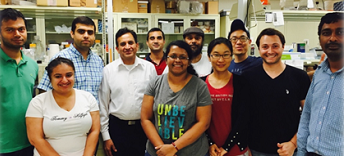Dr. Subba Reddy Palli Laboratory
Subba Reddy Palli, Principal Investigator
Department of Entomology
S-225 Agricultural Science Center North
University of Kentucky
Lexington, KY 40546-0091
Phone: 859 257 4962
Fax: 859 323 1120

RESEARCH PROGRAM
Interfering with regulatory mechanisms involved in critical physiological processes such as molting, metamorphosis, diapause and apoptosis can result in the death of pest insects. Studying some of these processes of pest insects and disease vectors at the molecular level could help in identification of targets that can be used for pest and disease vector control. We plan to use whole genome sequence data and functional genomics approaches including transcriptomics, metabolomics, RNA interference (RNAi) and genome editing to identify genes that are critical for the survival of insects. The genes identified will be used to develop high throughput screening assays for identification target-specific insecticides. The identified genes will be also used to perform toxicogenomics and pharmacogenomics that can help to elucidate the effects of candidate pesticides on the pest ecosystem.
Juvenile hormone (JH) regulates almost every aspect of insect’s life. Recent research from various laboratories around the world including our laboratory identified methoprene-tolerant (Met) as a JH receptor. Met interacts with other proteins including steroid hormone receptor co-activator and JH response elements and regulates expression of JH-response genes. Our recent studies suggest that epigenetics play an important role in modulation of JH and ecdysone action. Current research focuses on the molecular analysis of the epigenetic, nutritional and hormonal regulation of development and reproduction in Tribolium castaneum and Aedes aegypti.
RNAi has become a widely used reverse genetic tool to study gene function in eukaryotic organisms and is being developed as a technology for insect pest control. We are developing methods for using nanoformulation of double-stranded RNA to control insects that attack crops, trees and transmit infectious diseases. The efficiency of RNAi varies among organisms including insects and insects from different orders display differential RNAi efficiency, ranging from highly efficient (coleopteran beetles) to very low efficient (lepidopteran moths). We are investigating the reasons of varying RNAi efficiency between lepidopteran and coleopteran cell lines and also between the Colorado potato beetle, Leptinotarsa decemlineata and fall armyworm, Spodoptera frugiperda.
Transcriptomics and functional genomics methods including microarrays and RNAi were employed to identify genes that are overexpressed in deltamethrin and imidacloprid-resistant field-collected populations of Colorado potato beetle and bed bugs. Work is in progress to develop RNAi-based methods to fight insecticide resistance developed by these insects.
Prospective Students
Undergraduate and graduate student assistantships are available. Opportunities for practical training in physiology, biochemistry, endocrinology and molecular biology exist. Undergraduate students should contact RPALLI@UKY.EDU, and graduate students should follow the application procedure described below.
How To Apply
Visit our Graduate Program page to learn more about the application process.
Positions Available
Download the most recent PDF Announcement, with details about current positions in the Palli Lab.
Publications Link
http://www.ncbi.nlm.nih.gov/myncbi/collections/bibliography/43110576/
